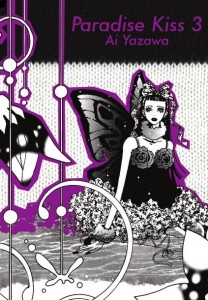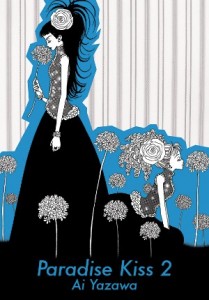I was very happy to have the chance to experience this great series again in the new editions from Vertical. Paradise Kiss is one of the most emotionally nuanced josei manga that I’ve read, and these gorgeous oversized editions make it possible to appreciate Ai Yazawa’s art. One of the reasons why I like this series so much is that for a manga about a group of fashion kids putting on a show, it manages to explore the subject of love in an extremely unromanticized way. Beginning model Yukari is beginning to go through a process of self-examination, deciding for herself what her priorities in life are. She’s pushed to this in part by George, who is one of my favorite romance manga leading men, just because he’s so atypical. Bisexual, ruthless and driven to produce his vision of haute couture fashion, George is showing Yukari a new world but he doesn’t have the emotional sensitivity to be a 17 year old girl’s first love. Add in a wonderful supporting cast in the form of cross-dresser Isabella, the punked-out Arashi and painfully cute Miwako, and the reader of Paradise Kiss gets a manga masterwork.
The second volume shows Yukari deciding to drop out of school. Seeing the ParaKiss team work together to create something meaningful has made the deficiencies in her own life far to clear. Yukari has been dedicating her life to studying due to her mother’s ambitions, and she wants to put school aside and work until she figures out what she wants to do. She ends up running away from home when her mother is less than thrilled with her new life plan. The ParaKiss team is dismayed, but somewhat supportive. George intones “Even if you end up in hell, I refuse to take any responsibility.” Yukari ends up staying at Arashi’s place while he visits his home, and this entire volume shows how sincere and well-meaning he is. Yukari and George end up becoming closer and she moves in with him, but she’s too restless to enjoy lounging around his apartment all day. She looks around for work and helps out with the dress for the big fashion show. The only person from Yukari’s old life who seems to be concerned about her absence from school is Miwako and Arashi’s old friend Tokumori.
There’s more dramatic tension in Yukari and George’s romance, because it is clear from the start that things aren’t going to work out. Yukari is too anxious, trying to meld her personality to reflect her idea of George’s ideal woman, and while George cares for her, he has the self-involvement of a true artist. His work will always come first. Even while Yukari tries to cling on to George, she knows that they are going to end up being incompatible.
Everything turns bittersweet in the concluding volume of the series, as Yukari begins to launch herself into a modeling career, and the ParaKiss group prepares their showstopping dress. Preparing for the show isn’t going all that smoothly as Yukari starts having health issues and difficulty dealing with jealousy when one of George’s old classmates comes back for a visit. There’s a general sense that everything is going to end one way or another after the show. George is making unsuccessful attempts to launch Paradise Kiss as a label, and having difficulty. If the label can’t sustain them, everybody is going to have to split up and get jobs separately. In a more conventional manga, the show would happen, George would get a grand prize for his dress, and everybody would live happily ever after. Paradise Kiss explores the fashion world in a much more realistic manner. While Yukari is tall, she lacks the towering height of a supermodel. George’s own elaborate sense of aesthetics is holding him back from the type of commercial creations that a successful fashion label would require, but he’s not going to compromise his vision. Yukari and George’s relationship goes from a whirlwind of love to a relationship where they’re both burdened by each other’s expectations.
What makes Paradise Kiss so interesting as a romance manga is that so much time is spent exploring the reasons Yukari and George are going to split up. The book basically takes place entirely in Yukari’s head, so it is easy for the reader to be just as uneasy as she is about George’s true feelings. When his grand romantic gesture comes at the end of the series, it is easy to see just how much he cared for her. Paradise Kiss had a very satisfying and realistic ending, which elevates it among most romance manga. It is rare for me to feel like all the aspects of an emotional story arc were fully explored, but Yazawa is just that good. Reading Paradise Kiss again made me pine for more Nana or the possibility of a Gokinjo Monogatari translation. The oversized volumes make it possible to appreciate all the intricate details of the fashion-centric world the characters inhabit. These great editions from Vertical deserve a place on any manga fan’s shelf.


 One notable read for me this week was volume 20 of Taeko Watanabe’s
One notable read for me this week was volume 20 of Taeko Watanabe’s  This week, I allowed myself the pleasure of reading the first volume of Vertical’s new omnibus release of Ai Yazawa’s Paradise Kiss, which of course is a long-time favorite for
This week, I allowed myself the pleasure of reading the first volume of Vertical’s new omnibus release of Ai Yazawa’s Paradise Kiss, which of course is a long-time favorite for 

 The debut volume of
The debut volume of 









